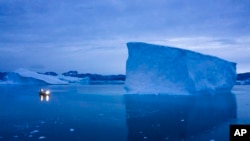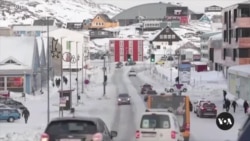Russia has said it is closely watching the situation with Greenland, following U.S. President-elect Donald Trump's refusal to rule out military or economic measures to take control of the territory from Denmark.
"We are observing this rather dramatic development of the situation, but so far, thank God, [it remains] at the level of statements," Kremlin spokesperson Dmitry Peskov told reporters on Thursday.
"The Arctic zone is a zone of our national and strategic interests. We are present in the Arctic zone, and we will continue to be there," Peskov added.
The vast territory of Greenland — most of which lies above the Arctic Circle — has been officially part of the Kingdom of Denmark since 1953, although the island has its own government.
National security
Questioned at a news conference in Florida on Tuesday, Trump said the United States needs Greenland for security purposes, and he refused to rule out using economic or military means to achieve that goal.
"People really don't even know if Denmark has any legal right to it. But if they do, they should give it up because we need it for national security. That's for the free world. I'm talking about protecting the free world," Trump said.
"You have Chinese ships all over the place. You have Russian ships all over the place. We're not letting that happen," he added.
Like much of the Arctic, Greenland is rapidly warming. That is changing the geopolitics of the region, said analyst Liana Fix of the Council on Foreign Relations.
"The Arctic is increasingly becoming a zone of a great power competition and rivalry. And the United States is concerned it is losing this game," Fix said.
"The Arctic becomes much more accessible, both for trading goods but also for critical minerals, especially for rare earth [minerals]," Fix said. "And also it becomes increasingly a militarized zone," she added, noting that Russia is cooperating with the Chinese coast guard in the region.
Not for sale
Denmark has made it clear that Greenland is not for sale. Foreign Minister Lars Lokke Rasmussen rejected the suggestion that Trump's comments presented a foreign policy crisis for his government.
"I see a president who is on his way into the White House, who has a heightened focus on the Arctic, and I can understand that he has that. We also have that from the Danish side, and we also have that within NATO," Rasmussen said Wednesday.
Denmark faces a dilemma, said analyst Fix.
"It is very clear for Denmark, too, that increased cooperation with the United States both on investments in Greenland but also on military cooperation would be actually in the interest of everyone," Fix told VOA.
Several European leaders rejected Trump's comments, although most stopped short of directly criticizing the incoming U.S. president.
German Chancellor Olaf Scholz said basic Western values were at stake.
"The principle of inviolability of borders applies to every country, regardless of whether it is to the east or west of us," he said.
French Foreign Minister Jean-Noel Barrot was more direct. "It is out of the question for the European Union to let any nation in the world, whichever it is — and let me say starting with Russia — define its sovereign borders," he said Wednesday.
Greenland independence
Greenland's government, meanwhile, is pushing for a referendum on full independence and has said that only the people will decide Greenland's future.
"Greenland is on its way into a new era and a new year in which Greenland has been at the center of world attention. The Greenlandic people are one people, regardless of where they live. And as people in the times we live in, we must be united in order to be ready for a new future that our country is on its way to," Prime Minister Mute Egede said during a trip to Copenhagen on Thursday.






